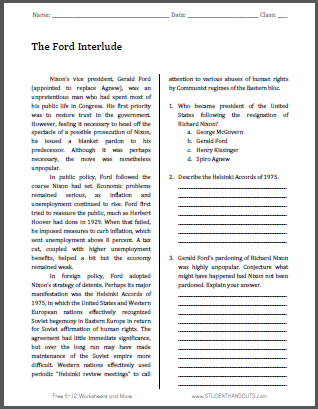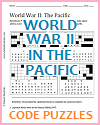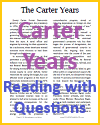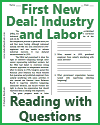| The Ford Interlude Reading with Questions |
|---|
| www.studenthandouts.com ↣ American History ↣ American History Readings with Questions |
Nixon's vice president, Gerald Ford (appointed to replace Agnew), was an unpretentious man who had spent most of his public life in Congress. His first priority was to restore trust in the government. However, feeling it necessary to head off the spectacle of a possible prosecution of Nixon, he issued a blanket pardon to his predecessor. Although it was perhaps necessary, the move was nonetheless unpopular. In public policy, Ford followed the course Nixon had set. Economic problems remained serious, as inflation and unemployment continued to rise. Ford first tried to reassure the public, much as Herbert Hoover had done in 1929. When that failed, he imposed measures to curb inflation, which sent unemployment above 8 percent. A tax cut, coupled with higher unemployment benefits, helped a bit but the economy remained weak.
In public policy, Ford followed the course Nixon had set. Economic problems remained serious, as inflation and unemployment continued to rise. Ford first tried to reassure the public, much as Herbert Hoover had done in 1929. When that failed, he imposed measures to curb inflation, which sent unemployment above 8 percent. A tax cut, coupled with higher unemployment benefits, helped a bit but the economy remained weak.In foreign policy, Ford adopted Nixon's strategy of detente. Perhaps its major manifestation was the Helsinki Accords of 1975, in which the United States and Western European nations effectively recognized Soviet hegemony in Eastern Europe in return for Soviet affirmation of human rights. The agreement had little immediate significance, but over the long run may have made maintenance of the Soviet empire more difficult. Western nations effectively used periodic "Helsinki review meetings" to call attention to various abuses of human rights by communist regimes of the Eastern bloc. Questions with answers in bold: 1. Who became president of the United States following the resignation of Richard Nixon? a. George McGovern b. Gerald Ford c. Henry Kissinger d. Spiro Agnew 2. Describe the Helsinki Accords of 1975. United States and Western European nations effectively recognized Soviet hegemony in Eastern Europe in return for Soviet affirmation of human rights. 3. Gerald Ford's pardoning of Richard Nixon was highly unpopular. Conjecture what might have happened had Nixon not been pardoned. Explain your answer. Answers will vary. Click here to print. |
 |  |  |  |  |  |
| www.studenthandouts.com ↣ American History ↣ American History Readings with Questions |














































